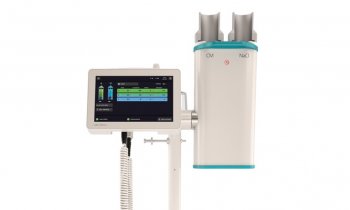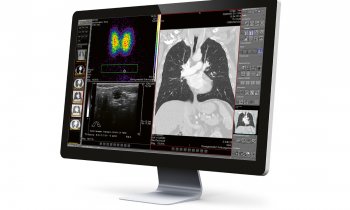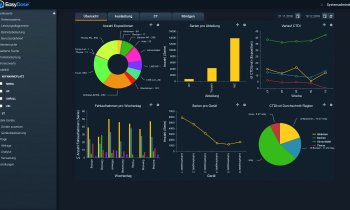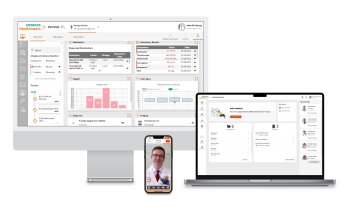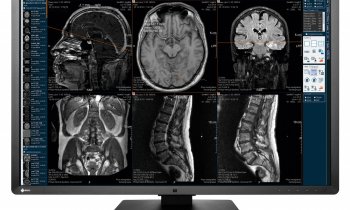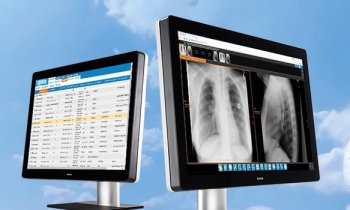European Hospital at the ECR
Daniela Zimmermann reports on the 2nd Hospital Administrator Forum.
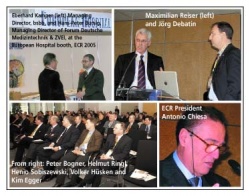
Apart from MEDICA, held in Dusseldorf, the annual European Congress of Radiology (ECR), in Vienna, is the most important event of the year for our European Hospital team. This year, there was an added reason to look forward to the biggest European imaging convention: in joint cooperation with the ECR and bsbb, the congress and event management company, we held the 2nd Hospital Administrator Forum. Whilst the magazine has focused, for several years, on one of the most exciting and innovative developments for hospitals today: the combination of radiological diagnostics with IT and networking, the Forum presented an opportunity to promote, communication between radiologists and hospital administrators, not only through our pages, but during a live event.
About 110 radiologists, hospital doctors, IT managers and industry representatives from 27 countries - hailing from Australia to Switzerland - assembled to discuss subjects such as ‘Successful Hospital Management - Facing the Challenges of Hi-tech and Financability’.
The fact that a comparatively small forum managed to attract participants from 27 nations with very different experiences of healthcare systems underlines the importance of constructive dialogue - an opinion shared by leaders of the ECR, as well as its President, Professor Antonio Chiesa. Welcoming the debate on hi-tech and finance he said: ‘The time has already come in which hospitals no longer rely solely on doctors - an opinion they also share. Doctors understand that a modern hospital is defined not only by its highly professional medical teams, but also by state-of-the-art equipment, informatics applications, and innovative programmes. Administrators play a key role in this changing world, where progressively reduced resources are met with rising costs. With an increasingly older and more numerous population, these obstacles prove a hefty challenge.’
In his ‘Radiological innovations: between hi-tech and financability’ lecture, Professor Maximilian F Reiser MD, Professor and Chairman, University of Munich, Department of Clinical Radiology, at Grosshadern, Germany, and mentor and moderator of the forum, added: ‘Radiologists and hospital managers should make every effort to convince financial decision makers that investment in medical technology and an IT infrastructure can improve the quality of healthcare and at the same time reduce costs. The one-sided orientation and support for pharmaceutical research and development has long been proven as an expensive error.’
An answer from the other side of the fence swiftly followed. Professor Jörg F Debatin MD MBA, formerly director of the radiology institute at the University Clinic, Essen, and currently Medical Director and CEO at the University Medical Centre, Eppendorf, Hamburg, responded, in a relaxed though proactive manner: ‘Healthcare is rapidly evolving from a totally non-transparent and heavily process-regulated system to a competitive market. To survive in such a market, hospitals will require the conscious development of marketing and sales strategies. These should be based on a product portfolio defined by quality, profitability and unique selling proposals. However, the basis of marketing and sales strategies must lie in providing transparency to the customer - the patient - regarding outcome quality and pricing of healthcare products.’
Dr Volker Hüsken, CEO at the University Hospital, Cologne, Germany, and Dr Helmut Ringl,
of the Department of Diagnostic Radiology, University of Vienna General Hospital (AKH), Austria, discussed technology, the implementation of new IT systems and the implications for hospital staff.
Dr Hüsken emphasised that hospital processes should be organised to allow doctors to concentrate on medicine, and that IT departments should do what they are best at: being technical advisors to all departments and for all processes.
Concentrating on the practical aspects of PACS implementation, Dr Ringl advised on the avoidance of mistakes when making decisions on purchasing these systems, which he described as brilliant instruments - when they work properly.
Professor Peter Bogner MD PhD, Vice-director of the Institute of Diagnostic Imaging and Radiation Oncology, University of Kaposvár, Hungary, described the hard work involved in setting up an IT project to link nine institutions of different size and competence. With a background of exclusively public funding and the involvement of the Hungarian national medical insurance body, the hospitals decided against a common, central archive accessible by everyone. Hence, he said, they are now looking for a suitable model that allows transparency and transport of data in a secure, protected manner.
Henio Sobiszewski, Regional Manager Central Europe, Toshiba Medical Systems Europe (OD), and Kim Egger, Sales Director Healthcare, of the Netherlands-based finance firm De Lage Landen, which specialises in asset financing and vendor finance programmes, introduced a model that enables independence from public funding. This demonstrated how, by establishing a limited company, the complete modernisation of a radiology department in a Polish hospital became possible. The concept had not only liberated employees from enforced models of working hours but also had ensured that capital could be acquired.
Later, in a relaxed atmosphere, complemented by a buffet on the top floor of the Ares Tower, discussions flowed on until quite late. In conclusion, everyone was unanimous: the exchange of knowledge and opinions at the Forum should continue. So, we are looking forward to the Hospital Administrator Symposium 2006.
07.08.2006






